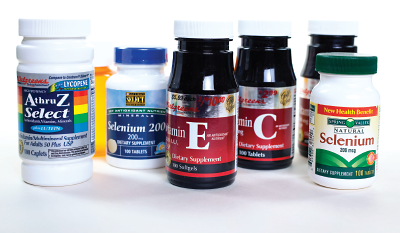One of the largest and longest-running dementia prevention studies has found that older men who take the popular antioxidants vitamin E and selenium—either alone or in combination—appear to be no less likely to develop dementia than those who do not take these supplements.
Despite several methodological limitations of the study, the findings suggest the antioxidants should not be used to prevent dementia.
The Prevention of Alzheimer’s Disease by Vitamin E and Selenium (PREADViSE) trial grew out of an older clinical trial called the Selenium and Vitamin E Cancer Prevention Trial (SELECT). SELECT, which enrolled males only, started in 2002 and tested whether selenium (200 mg/day) and/or vitamin E (400 IU/day) supplements could help prevent prostate cancer. After that trial was stopped for showing no benefits in 2009, about 4,000 of the participants agreed to continue taking one or both supplements or placebo as part of a dementia study. All the PREADViSE participants were free of dementia or any neuropsychiatric disorders that might affect cognition at the start of the trial.
At the conclusion of the study, the incidence of dementia was between 4 percent and 5 percent in each of the four groups (vitamin E, selenium, both, or placebo) with no statistical differences among them, Richard Kryscio, Ph.D., a professor at the Sanders Brown Center on Aging at the University of Kentucky, and colleagues reported March 20 in JAMA Neurology.
“The supplemental use of vitamin E and selenium did not forestall dementia and are not recommended as preventive agents,” Kryscio and colleagues concluded. They noted that in addition to the lack of benefits, research has shown that extended selenium and vitamin E use might increase the risks of diabetes and prostate cancer, respectively.
In a related editorial, Steven DeKosky, M.D., of the University of Florida and Lon Schneider, M.D., of the Keck School of Medicine of the University of Southern California noted that the dementia rates reported in the trial were low compared with national averages and may reflect another important limitation of this study—the young age of the participants. The average age at the start of PREADViSE was 67 years, with many participants as young as 60. Typically, dementia studies try to enroll adults in their 70s or older.
“Thus, it is unlikely that the PREADViSE trial could have detected a salutary effect from the vitamin E or selenium interventions, if indeed there was one to be had,” DeKosky and Schneider wrote. The pair acknowledged the challenges the researchers leading the PREADViSE trial faced, including finding a suitable, diverse population, and maintaining adherence over the long period required to see an effect.
“While there are study limitations such as inclusion of only men, loss of participants in switching from a study of prostate cancer to prevention of dementia, and dosing considerations, the findings clearly suggest a lack of usefulness of these supplements in preventing dementia in older adults,” said Dilip Jeste, M.D., a distinguished professor of psychiatry and neurosciences at the University of California, San Diego, and past president of APA.
Jeste told Psychiatric News that while more research is needed to develop medications to prevent dementia, there are steps older adults can take to delay the onset of dementia.
“It is worth remembering that considerable evidence exists to demonstrate the neuroplastic effects of physical activity, cognitive stimulation, social support, stress reduction, general health care, and other positive psychosocial factors including resilience and positive attitude,” he said. “Healthy lifestyle does not prevent dementia, but may delay the onset.”
The initial SELECT study was funded by grants from the National Cancer Institute, with further support from the National Institute on Aging to continue with PREADViSE. ■
An abstract of “Association of Antioxidant Supplement Use and Dementia in the Prevention of Alzheimer’s Disease by Vitamin E and Selenium Trial (PREADViSE) can be accessed
here. The accompanying editorial, “Preventing Dementia” is available
here.

